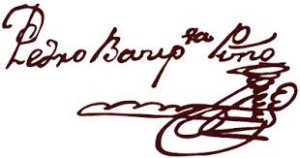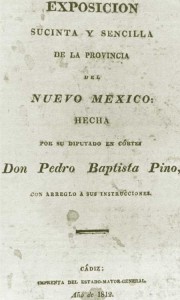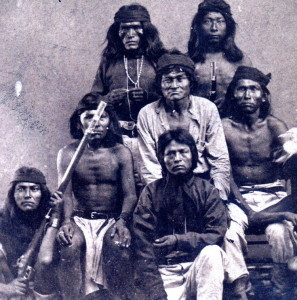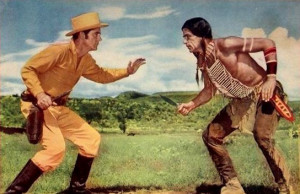Primary sources are always interesting but must be used with caution.
Don Pedro Bautista Pino, a New Mexican native, wrote his Exposicion of New Mexico for the Cortes of 1812. It has the usual survey of resources, population, and problems, and some interesting comments.It was supplemented by the Ojeada of Lic. Antonio Barreiro in 1832. Barreiro was a Mexican we moved in New Mexico.
For example, New Mexico was an exporter of wine, so the Gruet wines made famous by the Pot Thief novels were not the first on the scene.
Barreiro was not happy with the way the jail in Santa Fe was run: it seems to have been the predecessor of the one in Hogan’s Heroes:
There are only a few filthy rooms in the capital which may be called jails. Prisoners are rewarded rather than punished, whenever they are locked up in them since they are permitted to spend their time in noisy revelry (alegres triscas) and conversation. They take their imprisonment with the greatest nonchalance: at night they escape and go to dances; during the day they go to other forms of entertainment.
Pino has a low opinion of the Apaches:
The Apache tribe is the most obnoxious and cruel of all…. They always go naked, they kill and rob most treacherously; they torture their prisoners in the most cruel manner, often scalping them alive; then they cut up their bodies into small pieces. Lastly, the Apache, roaming round in every direction, has no other check to his depredations than that of the fear of the brave and honest Comanche….[!]
Not everyone shared that assessment of the Comanches.
How Barreiro had this opinion of the buffaloes beyond me:
Buffalos are so gentle (tan docil) that they like the company of man and be easily domesticated
Pino’s racial attitudes are interesting:
In New Mexico there has never been known any caste of people of African origin. My province is probably the only one in Spanish America that enjoys this distinction. Spaniards and pure-blooded Indians (who are hardly different from us) make up the total population.
Pino’s most interesting remark is on a sensitive subject:
He laments this abuse:
The first abuse is the refusal of Indian women to give birth to more than four children; they succeed in this abuse by the use of certain herbs (brebages); consequently, the Indian population has not increased. There were large numbers of Indians here at the time of the conquest and only one hundred and forty Spanish families; now, however, there are more than twenty-four thousand Spanish settlers and only about sixteen thousand Indians.
Pino blames the Indians for their failure to increase in numbers. However, he goes on to use this lack of population to justify Spanish encroachment on the Indian lands guaranteed to them by the Crown.
The lack of democratic vitality among the Pueblo Indians has been noted by historians and anthropologists. The Navajos, on the other hand, give the Mormons a run for the money in the size of their families, and consequently number about 250,000 today.
Demographic vitality is necessary to the survival of a culture because the best way to hand down language and customs is in the family.
I have wondered why the Pueblos have so few children. Of course part of the population problem is disease. Even before the Spanish came, town dwelling was not healthy. Hunter-gatherers had a more varied diet and avoided contagious diseases. Pueblo dwellers had a restricted diet; before modern situation, towns provided an excellent vector for diseases and parasites.
Perhaps pueblo dwellers also deliberately restricted their families to avoid overburdening the land. Pino thinks Indian women used contraception. I have wondered whether the custom of periodic continence for men for religious purposes also had that effect. A traditional Pueblo once complained to me that young men were sneaking out of the kivas during the long preparation for dances to visit their wives and girlfriends. As I said, it is a sensitive matter, and I have never asked a Pueblo Indian why their families have always been so small. It is none of my business; but I am concerned for the survival of their cultures.




epidemics might be behind the demographic collapse:
http://newmexicohistory.org/people/infectious-disease-in-eighteenth-century-el-paso-del-norte
and of course, anthropologists have found chronic malnutrition and iron deficiency and high child mortality
The use of herbal contraceptives might be behind the few number of offspring, but I suspect prolonged breastfeeding might be the custom to space births… in Africa, and in some AmerIndian tribes, vaginal intercourse is forbidden during breast feeding, but I don’t know if this was true for the Pueblo tribes, since as a physician I didn’t work with those tribes.